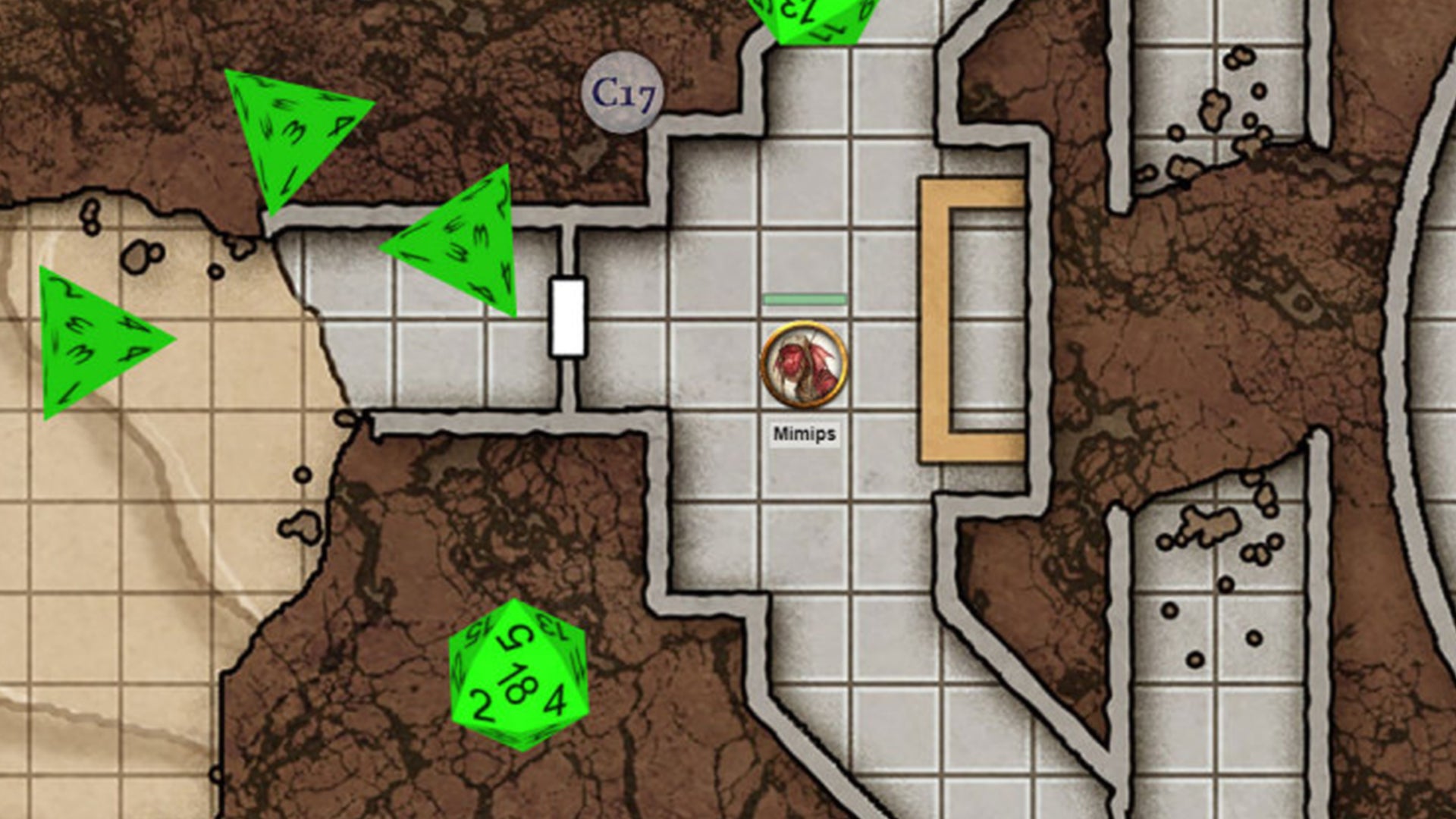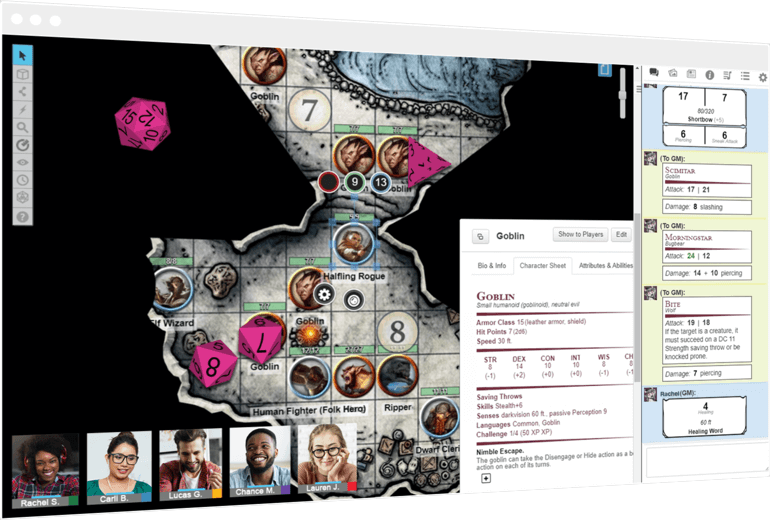“The Nimble GM” is a series by Jump Soap about organizing a tabletop role-playing game with minimal preparation.
Early 2020, I began my first stint as a Dungeon Master[1]While Dungeons & Dragons uses the term “Dungeon Master” or DM for the game organizer, “Game Master” or GM is a more generic term for the same role. for a Dungeons & Dragons campaign with a few close friends. I bought the official “Essentials Kit” bundle. This included the adventure “The Dragon of Icespire Peak.” I had hardly played any role playing games since I was a child generously invited to play with teenage relatives, so I was banking mostly on my creativity to carry me through. The players had even less experience than I did, so I figured I could at least trick them into thinking I was a decent DM.[2]The players, more importantly, are also kind, patient, and committed to having a fun time.
This was February 2020. We decided to play half-sessions weekly; that is, a two-hour session once a week.[3]A typical D&D session would be closer to four hours long. We met up at my home to do this, oh, maybe three or four times. Then, for some odd reason, we all simultaneously decided it would be better to meet virtually, through Discord video chat. We played around with roll20.net off and on, but mostly relied on “theater of the mind” combat and exploration, without a shared visual board.

During the COVID-19 pandemic, I saw many other people take up (or return to) tabletop role-playing to have fun and keep in touch with friends. I can attest, playing a TTRPG (tabletop role-playing game) is some of the MOST fun a person can have. Especially when one is limited to virtual meetings! The camaraderie of telling a collaborative story, the thrill of dusting off high school drama acting skills, and the anticipation of what could happen each week are all completely exhilarating.
Tabletop role-playing games, the ones like D&D, at least, are also a lot of work, but only for one player. The exact dynamic varies among groups, of course, but the general arrangement is that each Player is in charge of one character and that character’s actions, while the Dungeon Master plans, decides, and describes every event, locations, and character that the player characters encounter. Even with a “canned campaign,” such as the Dragon of Icespire Peak adventure book,[4]I have become aware that “The Dragon of Icespire Peak” is particularly lacking as an adventure for a beginner DM; there are probably other adventure books that do more of the heavy lifting. to provide locations and the basic scenarios, this takes a great deal of creative energy.

I was very excited to be a Dungeon Master. I thought myself well suited for it: I’m not employed at a full-time job (by choice; the lucky part is I don’t have to be). I’m used to telling stories, doing voices, and wrangling small groups to attention. But I also knew there would be challenges. I deal with depression and chronic migraines, and I’m absolutely, horribly bad about procrastinating. Also, you know, pandemic and politics and so on.
Well, in February 2021, my group wrapped our Dragon of Icespire Peak campaign.[5]Unfortunately for my players, the dragon did escape and live to fight another day. Although we didn’t keep a tally, I estimate that we had about 42 two-hour sessions. We had one player join midway through and drop out toward the end. When I told my players that I wanted to put Icespire Peak aside for a while and try out some other systems and stories, they said, “As long as we can keep playing!” As a group, we reviewed some of our favorite events from the previous year of adventuring and speculated on what could be fun going forward.

I learned a lot DMing for a year like this. While we played through the adventure, I tried out different levels of preparation and modification of what the book had planned. One quest was retooled into a murder mystery; some of the “sidekicks” provided by the book for small parties came in as temporary party members; I added in a whole festival day with a fighting tournament sidequest.
We had the most fun when I had a simple, compelling scenario planned without a fixed idea of the details. It was like telling a bedtime story over many nights; a basic scenario rich with possibility inspired the players to search for the stories they wanted. One player[6]Whom you may know as Your Bored Brother… was looking for a dramatic story of growth, strength, and uncertainty, so I helped him explore what it meant for his character to level up through roleplay with a mentor and looked for dramatic plot hooks in his play. Another kept making a joke of how uncouth and selfish his character was. I let him run with any ideas on how to debase himself and provided plenty of appalled reactions from NPCs.

At this time in my life, I’m not interested in running a plot-driven, preparation-heavy campaign. Responding in the moment to the players’ desires and affirming their individual visions of storytelling was so rewarding, when I was able to do it. I want to explore the factors that can foster this type of interaction at the role-playing table.
In my series “The Nimble GM” I’ll be discussing some tools, attitudes, and game systems that can help Game Masters forge a rewarding experience for everyone at the table while doing minimal “work” outside of the game sessions.
I’m glad for a chance to share my thoughts and experiences on the BrotherBored blog. I hope there are some fans of tabletop RPGs here interested in a lightweight, but personal, approach to GMing. Do you play Dungeons & Dragons or another TTRPG? If you GM, have you ever felt overwhelmed by the preparation? Or do you think that’s the fun part? Let me know!
Jump Soap is part of the BrotherBored editorial team. You can follow them on Twitter @jumpsoap.
Footnotes
| ↑1 | While Dungeons & Dragons uses the term “Dungeon Master” or DM for the game organizer, “Game Master” or GM is a more generic term for the same role. |
|---|---|
| ↑2 | The players, more importantly, are also kind, patient, and committed to having a fun time. |
| ↑3 | A typical D&D session would be closer to four hours long. |
| ↑4 | I have become aware that “The Dragon of Icespire Peak” is particularly lacking as an adventure for a beginner DM; there are probably other adventure books that do more of the heavy lifting. |
| ↑5 | Unfortunately for my players, the dragon did escape and live to fight another day. |
| ↑6 | Whom you may know as Your Bored Brother… |
